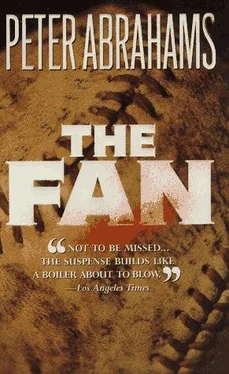Peter Abrahams - The Fan
Здесь есть возможность читать онлайн «Peter Abrahams - The Fan» весь текст электронной книги совершенно бесплатно (целиком полную версию без сокращений). В некоторых случаях можно слушать аудио, скачать через торрент в формате fb2 и присутствует краткое содержание. Жанр: Триллер, на английском языке. Описание произведения, (предисловие) а так же отзывы посетителей доступны на портале библиотеки ЛибКат.
- Название:The Fan
- Автор:
- Жанр:
- Год:неизвестен
- ISBN:нет данных
- Рейтинг книги:4 / 5. Голосов: 1
-
Избранное:Добавить в избранное
- Отзывы:
-
Ваша оценка:
- 80
- 1
- 2
- 3
- 4
- 5
The Fan: краткое содержание, описание и аннотация
Предлагаем к чтению аннотацию, описание, краткое содержание или предисловие (зависит от того, что написал сам автор книги «The Fan»). Если вы не нашли необходимую информацию о книге — напишите в комментариях, мы постараемся отыскать её.
The Fan — читать онлайн бесплатно полную книгу (весь текст) целиком
Ниже представлен текст книги, разбитый по страницам. Система сохранения места последней прочитанной страницы, позволяет с удобством читать онлайн бесплатно книгу «The Fan», без необходимости каждый раз заново искать на чём Вы остановились. Поставьте закладку, и сможете в любой момент перейти на страницу, на которой закончили чтение.
Интервал:
Закладка:
Gil struck a few more times, smashing a small hole. Then he knelt, snapped off a few jagged pieces-pine, but thin and pocked with knots-and peered inside. He saw the buttoned-up buttons of a white shirt, a white shirt decaying and full of holes; a scattering of little bones, palm and finger bones, resting on a rep tie, also eaten away; and, lying among the bones, a brass-plated baseball mounted on a hardwood stand, perfectly preserved. Gil stuck his hand inside and took the trophy. A few of the little bones came with it, one somehow slipping under the cuff of his shirt, sliding coldly up his forearm.
Gil let out a sound then, not loud, but totally uncontrolled by his larynx, vocal cords, brain. He shook his arm frantically, launching the bone into the brightening sky and out of sight. With the trophy in the other hand, he tried to scramble out of the hole, but lost his balance and tumbled back down the side, landing on the coffin. He made the sound again, perhaps more loudly this time, and then, without knowing how, he was up on ground level, clawing on all fours through the dirt, crawling at an unsustainable pace. He fell forward, and lay panting, his face on the icy grass. Gray light spread softly around him. He puked again, but nothing came out.
Gil got up, looked around, saw no one. Beyond the cemetery and down Hill Street, the town was still in shadow. He returned to the grave, filled it in, tipped up the stone, walked it back in position. Then, trophy in hand, his trophy, he turned to go. At that moment, something flashed orange in the woods, and he heard the crack of a rifle. Gil ran, ran as hard as he could, dodging gravestones, ran toward the road, cold in the small of his back, waiting for that cracking sound again, for the hot ball tearing through him. But there wasn’t a second shot. Gil slowed, glanced back.
A man stepped out of the woods. He had a rifle in one hand, and a doe over the opposite shoulder. Even from where Gil stood, the animal appeared to be under the limit; besides, it wasn’t hunting season. Gil understood at once: it was his hometown, after all. The man looked around, scanning the cemetery and beyond. Gil dropped behind a gravestone, a big one with a cross on top.
The poacher moved quickly through the cemetery, heading not toward Hill Street, but to a pickup Gil hadn’t noticed before in the darkness, parked behind a shed at the end of a dirt track. A big man, powerfully built, but grossly overweight. He had shoulder-length hair, an untrimmed black beard, and like many fat people didn’t appear to feel the cold: he wore jeans and a T-shirt. Blood stained his bare arms. Gil crouched behind the gravestone, and would have remained there, but as the man came closer, as close as his path was going to bring him, about twenty yards away, it struck Gil that there was something familiar about that rapid, bowlegged stride. He stood up.
“Co?”
At the sound of Gil’s voice, the poacher dropped the deer, wheeled, raised the gun, all in one quick motion, impossibly quick for such a huge man. That proved it.
“Who the fuck are you?” said the poacher, gun muzzle pointed at the middle of Gil’s chest.
Boucicaut, without a doubt. Gil had never been as happy to see someone in his life.
12
“ By God,” said Boucicaut, flinging a handful of deer intestines out the door of his one-room trailer, “some car you got there, Gilly.” The 325i sat in Boucicaut’s muddy yard beside the pickup, a rusted and doorless oven, bald tires, a stained mattress, windblown scraps, garbage. Gil, drinking coffee at the grimy-topped card table by the sink, remembered yards like that from his childhood, but the Boucicauts’ hadn’t been one of them.
“Thanks,” Gil said, but he knew the car was ruined for him now. It meant payments he could no longer make and that pissy smell inside; his mind shrank from the thought. “So what are you doing these days?” he asked. The coffee was trembling in his cup, as though the earth were unsteady, far below. He put it down.
“Running for Congress,” Boucicaut said.
Gil, not sure he had heard right, stared at him.
“Joke, man,” said Boucicaut. “What’d you think I’d be doing?”
That was easy, and Gil blurted it out: “Catching for the Sox.”
Boucicaut laughed a barking laugh, then said, “I don’t get you.”
“That’s what I always thought,” Gil said. “That you’d end up in the big leagues.”
“Then you were living in a dream world.” Boucicaut gave Gil a long look. The expression in his eyes changed. “That’s a sharp suit, Gilly. To go with the wheels.”
A cheap suit, compared to what was out there in the world of suits, and stained with coffee besides. Gil said nothing.
“How does it feel?”
“How does what feel?”
“Raking in the big bucks.”
“I wouldn’t know.”
“Don’t appear that way to me,” Boucicaut said. He had the deer laid out on newspaper on the vinyl floor and was gutting, skinning, and butchering it, all with a monstrously oversized and ill-made hunter, probably from China. Gil watched Boucicaut hack away for a minute or two, his oily black hair hanging over his face in two wings, then pulled out the thrower and gave it a quarter spin across the room. It stuck in the floor, a foot or two from Boucicaut’s hand. Boucicaut didn’t even twitch.
“Try that,” Gil said.
Boucicaut turned to him and smiled. Both incisors were missing. “You kept it up?”
“Kept what up?” said Gil, and rubbed his tongue over his chipped tooth.
“Throwing.”
“Not really.”
Boucicaut jerked the thrower out of the floor. “Your old man’s?” he said.
Gil nodded.
“What’s it worth these days, a blade like this?”
“I’m not sure.”
Boucicaut ran the edge lightly across the ball of his thumb. “Jesus.” A red line seeped onto the skin, taking the shape of a lipsticked and unsmiling mouth. Boucicaut licked it off and returned to the deer, using Gil’s knife. He sliced easily through the white tendon at the back of a hind leg; the long purple hamstring slid free.
How to hamstring a man, thought Gil: dive, roll, come up behind, slice just like that and just there. His father had taught him that with rubber knives, not far from where he now sat, in a trailer too, and with a yard outside and under the same sort of scudding clouded sky; but it had all changed.
“Sure knew how to make ’em, your old man,” said Boucicaut. He pushed himself up with a grunt, his stomach hanging over his belt, and opened the fridge. “Switch to beer?”
It was eight in the morning, Gil had a headache and still hadn’t eaten, but he said yes to Boucicaut. And thought, yes, wouldn’t it be nice if Boucicaut took over, took charge, took care of him, the way the catcher does the thinking for the pitcher.
Boucicaut took out four Labatt’s Fifties and handed him two, leaving a red smear on the fridge door. “Some watch you’re wearing, Gilly,” he said, Gil’s sleeve sliding up as he reached for the bottles.
“No one calls me that anymore.”
“No?”
“No.”
Boucicaut knelt over the deer. He stuck his hand in the rib cage, twisted, ripped out the heart. Then he whistled. A big black mongrel appeared in the doorway and Boucicaut tossed it to him. The dog caught it in the air and ran off. Boucicaut’s eyes fastened again on Gil’s car.
“No one calls you Gilly?”
“No.”
“What do they call you? Mr. Renard?”
“Some do.”
“Some do.” Boucicaut shook his head. “You made it, didn’t you, old pal? Went out into the big bad world and made good.”
Gil didn’t want to think about how he’d done. For the second time, he asked: “What are you up to these days?”
Читать дальшеИнтервал:
Закладка:
Похожие книги на «The Fan»
Представляем Вашему вниманию похожие книги на «The Fan» списком для выбора. Мы отобрали схожую по названию и смыслу литературу в надежде предоставить читателям больше вариантов отыскать новые, интересные, ещё непрочитанные произведения.
Обсуждение, отзывы о книге «The Fan» и просто собственные мнения читателей. Оставьте ваши комментарии, напишите, что Вы думаете о произведении, его смысле или главных героях. Укажите что конкретно понравилось, а что нет, и почему Вы так считаете.












